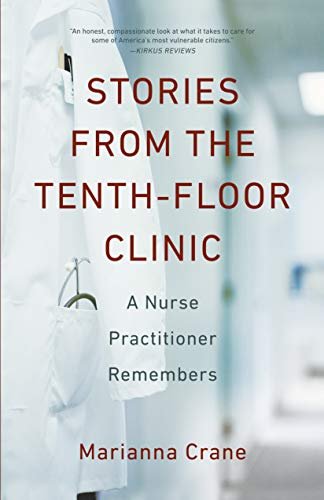Book Review: Stories From The Tenth Floor Clinic
Stories From The Tenth Floor Clinic. Marianna Crane. Berkeley, CA: She Writes Press, November 6, 2018, Trade Paperback and E-book, 212 pages.
Reviewed by Deb Lecos.
Marianna Crane has written an important memoir detailing the complex needs of an aging population and how a humane society should shift its thinking about what is “conscious-care” when people reach a certain level of fragility. The reader journeys along with Marianna while her beliefs change as a nurse practitioner, running a senior clinic within a Chicago-based, subsidized-housing building.
As a nurse practitioner specializing in gerontology at the Veteran’s Administration, Marianna is governed by strict parameters. When a job change takes her to a senior clinic within a CHA building, she faces an environment quite different from where she trained, and is forced to adapt so she can help those under her care.
Many of her patients are alone, disconnected from family, and easy prey for those intent on stealing their meager incomes. Continuing to live independently can be difficult when a patient’s health moves swiftly downhill and there are no friends or relatives to assist in decision-making. Residents of the building have come to rely on the clinic and its support staff to ensure they have social interaction, food in the refrigerator, and a fan when the heat becomes dangerously high.
After work, Marianna’s home life is fraught with similar issues, as a complicated relationship with her mother has reached an unsustainable level of dysfunction. Her mother has become increasingly combative, and her disinclination to engage therapeutically requires Marianna to devise a solution that is respectful to her husband and two teenage children, while ensuring her mother has a safe place to land. Utilizing the new approach that she’s been reluctantly taking with her patients affords Marianna necessary skills to handle this emotionally-challenging situation.
With chapters unfolding in story form, the reader glimpses the lives of vulnerable people. We learn what happens when the frail are shuttled into the corners of society without enough support. Filling that gap in care are Mattie and Mary, who work under the direction of Ms. Crane and are devoted to building humane over-sight relationships with the residents. Mattie and Mary compel Marianna to redefine her role in the clinic community by introducing her to Angelika, a woman choosing to die in her apartment instead of going to a hospital. Angelika has refused a diagnosis of the ailment ending her life. After losing the battle of Angelika’s resistance to leave her home, Marianna allows herself to adjust to the needs of those she is intent on helping. She comes to understand that sometimes care means respecting the wishes of a dying woman and not requiring her to take a final breath in the hospital, even if doing so breaks a dozen rules in the process.
The stories Ms. Crane starkly and, at times, graphically illustrates occurred in the 1980’s. Similar events are continuing to unfold today in subsidized housing and homes all across the country. Difficulties the aging and poor experience in navigating ill-health and death within a system built for the well-off and healthy have worsened in the time since the author encountered these experiences. The VA, health clinics, and senior care programs are still underfunded and mismanaged, exacerbating the condition of buildings and staffing needs.
There are no concrete solutions to the problems we face in determining how to care for a growing low-income, aging population. It is my fervent wish as a reader of this memoir that we do so with an ability to change our thinking, much as Marianna Crane convinced herself to do. Convenient, easily-enacted answers to the complex struggles of the elderly, many of whom are not connected to functional families, will not be successful. As Marianna came to her own epiphanies on how to be of assistance, so must our national community. This is a relational issue and it deserves a relationally-creative response, one that is centered on humane and caring treatment for all ill, infirmed, and end-stage-aged people.

